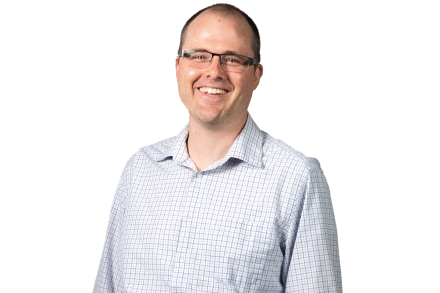We asked some of our most engaged faculty members to share what inspired them to become teachers and what keeps them going.
Throughout the years, Elon has held steadfast to the belief that students learn most deeply through engaged, hands-on experiences. It’s not surprising that in the most recent U.S. News & World Report rankings, Elon was recognized as No. 1 in the nation for undergraduate teaching. Leading this innovative teaching and experiential learning are dedicated faculty who are passionately committed to their vocation. But what inspired them to follow this path in the first place and what keeps them engaged year after year? See what they have to say.
Chris Harris
ASSOCIATE PROFESSOR OF FINANCE // CHAIR OF THE DEPARTMENT OF FINANCE // DIRECTOR OF THE CENTER FOR FINANCIAL LITERACY AT ELON UNIVERSITY
I always enjoyed learning. Whenever I learned things, even when I was an undergraduate student or when I started working professionally for an investment firm after college, I found that I really loved the idea of trying to learn more and then share that with people.
At first, I didn’t know I was going to become a teacher. Even when I did my Ph.D., I was investigating career paths outside of academia. I looked at a whole range of universities and decided I wanted something where I could interact with students, where I could actually have a personal connection with them and help them. But I found that’s not necessarily the vision that every school has. It almost was discouraging, going through a doctoral program, and then looking for jobs and realizing that may not be what a career path in teaching held for me.
It wasn’t until I came to Elon that I recognized a difference in the culture — the opportunity to innovate, to stay excited in your field and the encouragement to actually connect with students. I just thought, “That’s the environment I want to be in.” I want to be able to help people on a one-on-one level. And I want to be able to hopefully teach in a way that helps students feel excited, feel like it was worth their time and energy to be there, to pay attention and to be involved in the class.
That’s why I’m here, and I know many colleagues who feel the same way. It’s a unique school. I think that engaged learning is a buzzword that’s used everywhere, but I see it every day here in class and in my office hours. I see what that means, and it’s exciting. It’s a great environment to be in.
The field of finance really is a forward-looking discipline. It’s really about seeing what’s ahead and trying to make decisions now based on uncertain information and limited resources — How do we try to make the best decision for the future? So I love to continue learning, I love to see the things that are coming and the possibilities that exist. And I think that keeps me going, because it’s so much easier to walk into a class and say, “Did you know about this? Now here’s what we’re learning today.”
Steve Friedland
SENIOR SCHOLAR AND PROFESSOR OF LAW AT THE ELON UNIVERSITY SCHOOL OF LAW
Why teach? I guess it was in my blood. Both of my parents were teachers. My mother was an elementary school physical education teacher. My father was a guidance counselor and then principal of a high school. I had no plans on becoming a teacher, but as I learned quickly, it’s great. When you find your happy job, you just stay there.
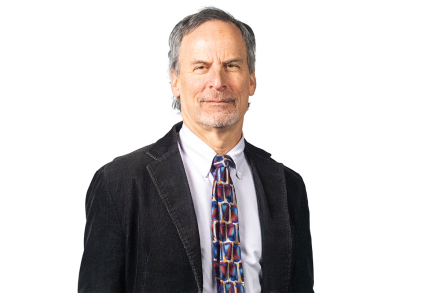 To this day, I try to emulate the example my parents set for me, particularly my mom. When I was very young, I would laugh when my mother was going to teach her phys ed classes, thinking all she might do was roll a ball out. But as I got older and I saw the kind of preparation she had, I had so much more respect for what she accomplished. When I flailed about as a newer teacher, I realized she is the best teacher I’ll ever know. She really cared about her students and her craft. I was lucky in that I saw what a good teacher was like and had great role models.
To this day, I try to emulate the example my parents set for me, particularly my mom. When I was very young, I would laugh when my mother was going to teach her phys ed classes, thinking all she might do was roll a ball out. But as I got older and I saw the kind of preparation she had, I had so much more respect for what she accomplished. When I flailed about as a newer teacher, I realized she is the best teacher I’ll ever know. She really cared about her students and her craft. I was lucky in that I saw what a good teacher was like and had great role models.
Even after all these years of teaching, I look forward to seeing the light bulbs go off with my students, observing them becoming, starting to live their lives fully. I view myself as the coach on the side, not the sage on the stage. I’m like a river guide. All I can do is create the environment and hope that they’re paddling with me in the right direction. And when I see them really achieve, it’s as if I’m achieving, too. So any achievements I have are through them. And it’s great when I hear from students 10-15 years later and see what they’ve become. It’s nice to have played a tiny role in where they are.
I get to carry the mace for the law school graduation, which is getting heavier every year. I really enjoy it because I am the first one marching into the auditorium and I get to see all the expectant looks from the families and friends, all the students’ support groups. It gives me great pride when I see the students walk across the stage to get their diplomas because I know how much they had to put into this experience. It wasn’t just something that was handed to them. Our students are willing to get up every day and really push themselves. And that’s what I love about what they do and where they go. Life is not about great days or years. It’s often about moments, and I view graduation as their moment, a moment that will stick with them for the rest of their lives. I’m just glad to be there to share it with them.
Naeemah Clark
PROFESSOR OF CINEMA AND TELEVISION ARTS // CHAIR OF THE DEPARTMENT OF CINEMA AND TELEVISION ARTS // J. EARL DANIELEY DISTINGUISHED PROFESSOR // FACULTY ADMINISTRATIVE FELLOW IN THE OFFICE OF THE PRESIDENT
Initially, I went to undergrad to be an English teacher because I always loved my high school English teachers. And then I taught briefly a sixth-grade class and thought, “Oh, sixth grade is hard,” so I went to graduate school to be a reporter. Soon I discovered that I like teaching undergraduate students about the media industry, so I thought, “Oh, maybe I should be a college professor,” and that’s what brought me to Elon.
 Sometimes, when I’ve just had a long weekend or a long day, knowing that I’ve got class always gives me a boost because I like talking to my students. I like sharing what I know and hearing a little bit about what they know and seeing their creativity and how smart they are. I think students are really a big part of what gets me out of bed every day, because I know I get to work with them.
Sometimes, when I’ve just had a long weekend or a long day, knowing that I’ve got class always gives me a boost because I like talking to my students. I like sharing what I know and hearing a little bit about what they know and seeing their creativity and how smart they are. I think students are really a big part of what gets me out of bed every day, because I know I get to work with them.
It wasn’t always easy during the pandemic, but I knew that I had content I wanted to deliver, content that I thought would make them great when they graduated, make them excellent in their professions in terms of diversity, equity and inclusion, and in terms of media industry policy. So even though it was hard, even though there were days that you just wanted to stay in bed, you know you’ve got good stuff you want to share, and you hope that you’re going to change them in a way that they change the industry. Because of what I do — I teach about media and entertainment — what they are creating is going to touch other people’s lives, so I hope that I’m inspiring them in that way.
In my classes, I like to talk about the importance of understanding who you are, what your position is in the space that you’re in and making sure that every decision you’re making is about creating a better situation for everyone else you come in contact with. I think that is a huge part of my equity-minded approach to education — that yes, some people are going to do great in a certain situation, but how do we make it better for everyone? That’s hard work because you must think about who is not being included, what conversations aren’t being had, and then also where am I getting an advantage that other people aren’t and how can I make sure that other people are also able to experience that kind of equity? That is important for me to share with students and with my colleagues as well.
Jen Uno
ASSOCIATE PROFESSOR OF BIOLOGY // ASSOCIATE DIRECTOR, CENTER FOR TEACHING AND LEARNING (EFFECTIVE FALL 2022)
The first thing I ever taught was dance. I loved dancing when I was a kid, so it seemed natural to teach something that I adored doing. Similarly, in college, I was fascinated with biology classes so finding a career where I could share that knowledge with students also seemed like a natural fit. Now that I’ve been teaching for a while, I still love science and am passionate about teaching how the body works. Science is all around and in us — it is eye opening and amazing.
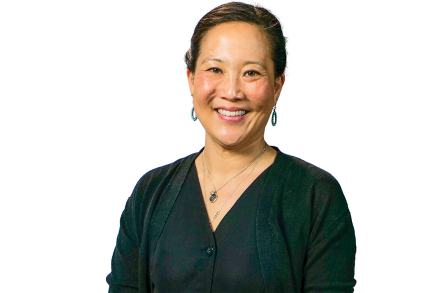 But beyond that, I also very much enjoy watching students learn; seeing them discover things that I, too, enjoy learning about and making connections that lead to those “aha!” moments in class. Watching students really struggle to understand a concept and then have something suddenly click — those are my favorite classroom moments. It always makes my day and motivates me to do more.
But beyond that, I also very much enjoy watching students learn; seeing them discover things that I, too, enjoy learning about and making connections that lead to those “aha!” moments in class. Watching students really struggle to understand a concept and then have something suddenly click — those are my favorite classroom moments. It always makes my day and motivates me to do more.
Teaching really is a continuous journey where I get to keep learning and teaching things that I genuinely enjoy. Even during the pandemic, it was truly awesome to see science at work in the face of this new virus and what that means for our community at Elon and beyond. I was and still am learning more about it and sharing that information with my students as we negotiate together through the challenges of this pandemic.
For me, teaching is an opportunity to keep learning, discovering and sharing. That’s what makes it entertaining and exciting every day. I love getting those emails at the end of the semester from the student that I connected with or a former research students letting me know they successfully defended their Ph.D. and are coming back for a visit. For me, those moments also keep me going — knowing that I have, even in a small way, contributed to a student’s life path. They remind me why I chose to teach. It’s always fun and inspiring to see how much they’ve grown, and I love hearing about their journeys, seeing their successes.
I feel very lucky to have so many great relationships with Elon students. Last year, in the heart of the pandemic, one of our biology alumnae got married. My kids were in her wedding, I did a reading and my husband officiated the ceremony. It was such a special day and speaks to the bonds and relationships that develop on this campus. But this is just one story; there are many more. The relationships where you develop those special connections you have for the rest of your life — that also makes teaching unique and special. I have a similar bond with my undergraduate research mentor. We still communicate on a regular basis, and it means the world to me. I can only hope it means the same to the students that I’ve mentored here at Elon.
Evan Small
INSTRUCTOR IN THE DEPARTMENT OF EDUCATION & WELLNESS // ASSISTANT DIRECTOR OF EXPERIENTIAL LEARNING AND OUTDOOR ADVENTURES, CAMPUS RECREATION & WELLNESS
I always knew I wanted to work with students. One of the things that really interests me is helping students make meaning of experiences and helping them recognize the power of their voice and their ability to influence change in the world. Specifically in my field of experiential education, it’s recognizing the transformative power of those experiences and how these can shape my students and the community around them. I want them to connect the dots between school and the real world, and really put what they’re learning into practice. That’s always been exciting for me.
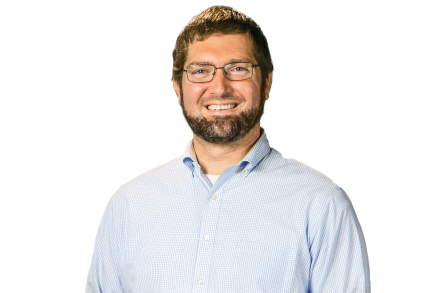 We often make this divide in education between school and the real world. I really appreciate teachers who start to break that down, who help students recognize that what we’re doing in class is directly connected to our ability to influence the broader community. I appreciate teachers who center community in their class, who really help students feel heard and valued and seen in their classroom. I think about what it means to be in community with each other. How do we create knowledge? What does that look like in an academic space? That’s always been something I do in my teaching practice that I’ve appreciated from previous teachers.
We often make this divide in education between school and the real world. I really appreciate teachers who start to break that down, who help students recognize that what we’re doing in class is directly connected to our ability to influence the broader community. I appreciate teachers who center community in their class, who really help students feel heard and valued and seen in their classroom. I think about what it means to be in community with each other. How do we create knowledge? What does that look like in an academic space? That’s always been something I do in my teaching practice that I’ve appreciated from previous teachers.
It’s always exciting for me when students come back and I can help them see what we have now and how that’s connected to their experience, how we wouldn’t have what we have now or be where we are now without them. We always hear from President Book that the world needs Elon graduates and that’s absolutely true. It’s exciting for them to be able to go out into the world, taking what they’ve learned here and the experiences they’ve had here and impact their communities and have that change be felt around the world. It’s always exciting to see them leave and see them do great and amazing things wherever they go.
Sophie Adamson
ASSOCIATE PROFESSOR OF FRENCH // CHAIR OF THE DEPARTMENT OF WORLD LANGUAGES & CULTURES
What inspired me to become a professor is what inspires me still every day, and that is this fierce conviction that everything can be taught and that everybody has the capacity to learn. I find it fascinating to figure out the key to what helps somebody learn and the tools I need to connect with my students. The most effective teachers are the ones who really believe that learning how people learn is fascinating and worth figuring out.
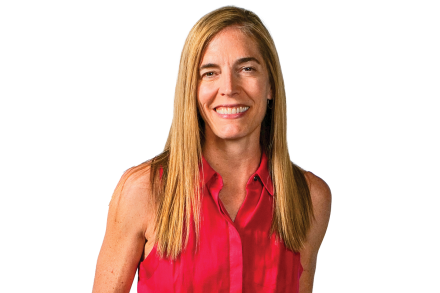 Anybody can teach new content, but it seems even more important to figure out the intangibles, like what motivates or inspires people, how do you get critical thinking and inquiry and engagement and connection regardless of the day’s lesson or topic. I’m a French professor, and I also teach in the Core Curriculum and the Global Experience. Every time students walk out feeling like they learned something is when I feel totally inspired and ready to do it again the next day. They may come in sometimes deflated or confused, and it’s our job to figure out how to make the pieces fit for them.
Anybody can teach new content, but it seems even more important to figure out the intangibles, like what motivates or inspires people, how do you get critical thinking and inquiry and engagement and connection regardless of the day’s lesson or topic. I’m a French professor, and I also teach in the Core Curriculum and the Global Experience. Every time students walk out feeling like they learned something is when I feel totally inspired and ready to do it again the next day. They may come in sometimes deflated or confused, and it’s our job to figure out how to make the pieces fit for them.
I think the best thing you can give to another human being is a new skill, a boost in their confidence and the motivation to want to keep learning. It can happen every single day in the classroom because we’re engaging and learning things, thinking critically and asking questions. Even if it’s small progress, it’s progress.
Another one of the most rewarding aspects about being a professor is what happens outside the classroom, although it couldn’t happen without the bond we’ve created in the classroom. They go hand in hand, and that’s what sets Elon apart — we are engaged with our students all the time. We are club and academic advisers. We study abroad with them. We have these impromptu coffee conversations. We go out to meals. There’s so much more that happens between students and professors outside the classroom, so it is inevitable that we grow together. It is not one-sided. I don’t know if students know that, but they impact us as well. We may be at different stages of our lives, but professors never stop growing and learning from our students. And it’s so meaningful to us to have those relationships.



